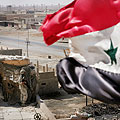Wednesday, June 28, 2023
Not Found
The requested URL /collections/issues/include_collection_navigation.shtml was not found on this server.
Coverage from Minnesota Public Radio
World leaders addressed the most divisive issue currently before the United Nations: the invasion of Iraq and the plans to turn control over to Iraqis. They also said they agreed the UN needs to fight the spread of weapons of mass destruction.
( 09/24/2003)
NPR special live coverage continues, including analysis and a speech by French president Jacques Chirac. France has urged the U.S. to hand over control of Iraq to the Iraqi interim government.
( 09/23/2003)
We preview Tuesday's United Nations General Assembly meeting. The Iraqi Governing Council set up by U.S. officials has been pressing to win sovereignty as an interim government in Iraq. At the same time, France and Germany are leading a push to give the U.N. more authority in Iraqi reconstruction and to set a timetable for handing over power to the Iraqis in a matter of months. Pres. Bush said he will declare in his speech Tuesday at the U.N. General Assembly that he "made the right decision and the others that joined us made the right decision" to invade Iraq.
( 09/22/2003)
Family members of Minnesota National Guard troops deployed to Iraq say they're angry that their relatives won't be coming home soon. In early September, Army officials announced that reserve troops in Iraq could be there as long as a year. That means members of Camp Ripley's 142nd Engineering Division may not come home until summer of 2004. Minnesota National Guard officials understand why the families are upset, but say there's not much they can do.
(09/22/2003)
Pioneer Press reporter Hannah Allam went on assignment in Iraq. She talks about her experiences there, and her interviews with Iraqi fighters who say they're working to oust U.S. troops.
( 09/19/2003)
Much of the news about the war on Iraq has focused on the death toll of U.S. soldiers, especially the number of deaths since President Bush declared the end of mayor combat in early May. The seriously wounded get less attention, even though they significantly outnumber the dead. Caught up in sniper fire, and targeted by homemade bombs and Rocket Propelled Grenade attacks, troops are losing arms, legs and eyes. We discuss the future for the injured troops, and how they're getting home to the U.S.
( 09/17/2003)
Correspondent Deborah Amos spent seven weeks in Iraq covering the critical post-war period for National Public Radio. Minnesota Public Radio's <i>American RadioWorks</i> examines why the fighting in Iraq continues long after the fall of Baghdad. Through the voices of American soldiers, Iraqi citizens and U.S. policy experts, correspondent Amos investigates the factors fueling resentment and armed insurgency.
( 09/16/2003)
Much of the news about the war on Iraq has focused on the death toll of U.S. soldiers. The seriously wounded get less attention, even though they significantly outnumber the dead.
(09/14/2003)
President Bush, facing doubts about his handling of Iraq amid rising casualties, is asking Congress for $87 billion to fight terrorism and cautioning Americans that the struggle "will take time and require sacrifice." Despite calls from Republicans and Democrats alike for more troops, Bush said the 130,000 U.S. forces in Iraq were sufficient.
But he urged other nations, even those that had opposed the war, to contribute troops and money.
( 09/08/2003)
A cement truck packed with explosives detonated outside the offices of the top U.N. envoy in Iraq, killing him and 19 other people and devastating the U.N. headquarters here in an unprecedented suicide attack against the world body. At least 100 people were wounded. The bombing blasted a six-foot-deep crater in the ground, shredded the facade of the Canal Hotel housing U.N. offices and stunned an organization that had been welcomed by many Iraqis.
(08/19/2003)
A Wisconsin Army reservist was buried Wednesday in his home town of Spooner, Wisconsin. Sgt. First Class Dan Gabrielson died in Iraq on July 9, when his truck was hit by a rocket-propelled grenade. His nephew -- also a reservist in the same platoon -- accompanied Gabrielson's remains home to Spooner for the funeral.
(07/23/2003)
About 300 people filled St. John's
Lutheran Church here Tuesday for the funeral of Pfc. Edward James
Herrgott, the first Minnesotan killed in the war in Iraq.
Herrgott, 20, was guarding the National Museum in Baghdad on
July 3 when he was shot and killed by a sniper.
(07/15/2003)
Funeral services will be held this week in Shakopee for Edward James Herrgott, the first Minnesotan to die in the war with Iraq. Herrgott, a member of the 1st Armored Division, fell victim to sniper fire while on patrol in Baghdad on July 3. His family and friends want him remembered as a regular kid who was working to hard to become a responsible adult.
(07/14/2003)
Critics are challenging intelligence produced by the Bush administration that led to the U.S. war on Iraq. President Bush says he stands by claims that Iraq had a weapons program and that it's only a matter of time before evidence of the program is found.
( 06/10/2003)
U.S. officials are hoping a new civilian administrator will bring greater order to Iraq. Among Paul Bremer's first tasks will be to help form a democratic Iraqi government not dominated by Shiite Islamic fundamentalists.
( 05/13/2003)
Not Found
The requested URL /standard/include/mpr005/global_module_shortcuts.shtml was not found on this server.
Services
- HD Radio
- newiPhone app / Mobile
- E-mail newsletters
- RSS feeds
- Podcasts
- Submit your photos
- Videos
- Weather
- Most e-mailed stories






